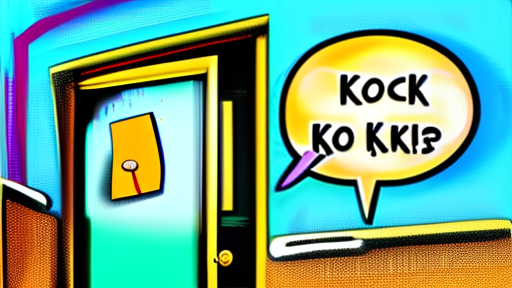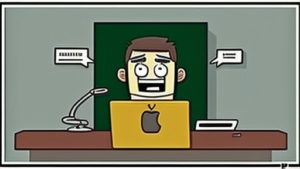Accountancy Jokes | 40th Birthday | Dad Jokes | Link 4
.jpg)
The origin of knock knock jokes
Knock knock jokes have been around since the early 20th century. They were used as playful banter and soon became popular in vaudeville performances. It's thought they started as a folk game similar to Pig Latin, with words or phrases being changed into rhymes or puns.
The classic call-and-response structure evolved. This consists of two people having a conversation which includes "knock knock," "who's there?" and "name who?" before the punchline. As it gained more popularity, it ended up in movies and comedy shows.
These jokes aren't just funny - research shows they help children learn communication. They need a sharp mind to craft an excellent joke and this develops vocabulary and social-emotional intelligence.
Pro Tip: Deliver the jokes with good comedic timing and lively expressions for maximum laughter! Also, they're great for awkward social situations.
The rise in popularity of knock knock jokes
Knock knock jokes have been on the rise since the early 20th century. Radio shows and comedy routines boosted their popularity during the 1930s and 1940s. They were featured in TV shows and movies from the 1950s to now. Social media has also been a big help, with videos and memes shared daily.
People have created modern versions of knock knock jokes, which rely on puns, wordplay and situational humour. This joke format is timeless and people from all over the world enjoy coming up with their own versions. Even companies use knock knock jokes for marketing!
Pro Tip: Timing is key when telling a knock knock joke. Allow enough pause before revealing who's at the door for maximum effect.
Knock knock.
Who's there?
Interrupting cow.
Interrupting cow wh-MOOOOOOOOOO!
Variations of knock knock jokes
To understand the variations of knock knock jokes with 'History of knock knock jokes' as the solution, we will explore knock knock jokes in different cultures and famous knock knock jokes in history.Knock knock jokes in different cultures
Knock-knock jokes have spread globally. Knowing cultural variances adds to an appreciation for them.
In South Africa, they are known as 'who's there' jokes. In France, it's 'Toc Toc' jokes. China and Japan usually utilize wordplay and puns. In Latin America, it's "¿Diga?"
Different cultures have different humor. Respect other cultures' jokes even if they're not your own.
The history of knock-knock jokes is mostly unknown, due to human migration and colonization. However, even Napoleon liked them, but always wanted to be the one to say 'Knock knock'.
Famous knock knock jokes in history
Knock-knock jokes have been making audiences laugh for decades. No matter how old, they still get a chuckle! Like:
- Knock-knock. Who's there? Boo. Boo who? Don't cry, it's just a joke!
- Knock-knock. Who's there? Interrupting cow. Interrupting cow- Moo!
- Knock-knock. Who's there? Banana. Banana who? Knock-knock. Who's there? Banana. But then, Orange you glad I didn't say banana again!
- Knock! Knock! Who's there? Water. Water who? Water you doing?
- Knock-knock. Who's there? Doctor. Doctor who? (A play on words!)
Historically, these jokes had to be presented by talented comedians to diverse audiences, to gain recognition. To be successful with a Knock-Knock joke, you need confidence, perfect timing, and an art of storytelling. That's the only way to make sure your audience will burst out laughing!
Why did the knock knock joke only have a small impact? It didn't knock anyone's socks off!
The impact of knock knock jokes
To understand the impact of knock knock jokes on modern culture and everyday communication, explore the sub-sections: Their role in modern comedy, The use of knock knock jokes in everyday conversation. Each sub-section sheds light on the versatility of knock knock jokes and how they have become ingrained in our daily lives.Their role in modern comedy
Knock-knock jokes are staples of modern comedy! They deliver quick wit, providing comedic relief that's accessible to all ages. Plus, they've become a cultural phenomenon, known for their memorable simplicity.
In our fast-paced world, they're perfect for lightening the mood in any situation. They're easy to understand across cultures, and great for novice comedians looking to develop their timing.
These jokes may seem simple, but they can be powerful when used correctly. No matter the audience - from children to seniors - a well-crafted knock-knock joke will bring immediate reactions. That's why they remain popular in stand-up routines.
Pro Tip: Keep your audience in mind when delivering jokes, and use punchlines that fit their sense of humor. This will earn you more laughs, and make your reputation as a comedian soar! Even if knock-knock jokes are cheesy, they're great for awkward small talk!
The use of knock knock jokes in everyday conversation
Knock knock jokes are everywhere in daily conversations. They stand out with a unique quality that makes them popular for amusement and hilarity.
- They start conversations in social gatherings, encouraging conversations.
- They bring relief from serious situations, reducing tension and stress.
- Knock knock jokes can be used to hint a message without directly saying it.
- These humorous jokes bring laughter and joy into our lives, making us happy.
Individuals use knock knock jokes to make conversations more interesting. For example, they can be used in business presentations or speeches to keep the audience alert while delivering information.
It is important to find creative new ways to use knock knock jokes to make full use of their effect on conversations. Making people laugh with funny one-liners and stories forms connections based on shared humor.
Make sure to include some knock knock jokes in your talks to add life to conversations! You may be amazed at how it influences those around you. The future of knock knock jokes is unknown, but if we hear one more "Orange you glad I didn't say banana?" we'll all go crazy.
The future of knock knock jokes
To explore the future of knock knock jokes with predictions for their evolution and the enduring appeal, we will delve into the many possibilities for this classic form of humor. With time-honored traditions mixing with new cultural trends, knock knock jokes remain a beloved source of laughter and amusement for generations to come.Predictions for the evolution of knock knock jokes
Knock-knock jokes are evolving. Technology is adding new elements like chatbots and virtual assistants to keep audiences engaged. Memes and trending topics will breathe new life into this classic, while retaining its original charm. Social norms are changing, so punchlines and delivery styles must adapt.
Robin Williams was known for answering prank calls using different accents and asking "who's there?", showing how these jokes can bring people together.
Why did the tomato turn red? 'Cause it saw the punchline coming!
The enduring appeal of knock knock jokes
Knock knock jokes have been a classic for years. What makes them so timeless? Here's the answer: they are easy to remember and share, they encourage interaction, they often have surprising puns, they can be tailored to different age groups, and they provide humor without getting too offensive. Plus, you can change the words to come up with creative new variations. Crafting a perfect joke requires creative language skills.
Plus, knock knock jokes are popular across cultures - they're just funny! According to Psychology Today, solving riddles gives us pleasure because it releases dopamine in the brain. It's no wonder why we love knock knock jokes! Looking forward, we can expect even more creative variations of this comedy classic.
Frequently Asked Questions
1. What is the origin of knock knock jokes?
Knock knock jokes are believed to have originated in the early 1900s, possibly as a variation of a game played by children in which they would knock on a door and say "knock knock" before running away.
2. When did knock knock jokes become popular?
Knock knock jokes gained popularity in the 1930s and then again in the 1950s, with many appearing in books, magazines, and comedic routines.
3. Why are knock knock jokes so popular?
Knock knock jokes are popular because they are simple, silly, and accessible to all ages. They also often rely on word play and puns, which can be satisfyingly clever.
4. Are knock knock jokes considered to be "dad jokes"?
Yes, knock knock jokes are often associated with "dad jokes" – that is, jokes that are considered corny or cheesy, but still funny in their own way.
5. Have knock knock jokes evolved over time?
Yes, knock knock jokes have evolved to include more complex puns and cultural references, as well as variations on the classic formula, such as "Orange you glad I didn't say banana?"
6. Are knock knock jokes still popular today?
Yes, knock knock jokes are still popular today and can be found in books, online, and in daily conversation. They continue to be a beloved form of silly humor.



